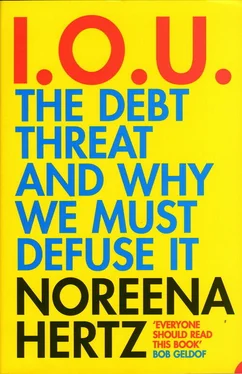In the United States, however, despite the support of various religious groups, the Jubilee coalition had almost no profile, and its campaign – to get the world’s richest countries to commemorate the millennium by cancelling the debts owed them by the world’s poorest countries – had completely failed to take off. But without the US making a serious commitment to debt relief, the whole Jubilee campaign would falter. The $6 billion debt owed to the US by the poor countries was an albatross around their already scrawny necks. More critically, there could be little progress towards cancelling the $70 billion the world’s poorest countries owed the World Bank, the IMF, and regional development banks unless America played a major role.
Jamie Drummond, a young British debt campaigner, who had been charged with getting the United States more engaged, decided to think outside the envelope. He saw that there wasn’t time to rally the kind of mass public support that had proven so effective in getting debt on to the European political agenda. It was early 1999 and the millennium clock that marked the deadline for the Jubilee campaign was ticking very loudly. And so he decided to go a completely different route.
In the States, celebrity was, he figured, the quickest way of entering doors and ramping up support. And Bono, the Irish singer, whose band U2 had sold over 100 million records, and who was known for his staunch support of human rights, the environment and development issues was, Jamie believed, his man.
Luckily, Jamie’s father had a useful neighbour on the west coast of Ireland. Through Chris Blackwell, the legendary founder of Island Records, Drummond managed to reach Bono.
Bono was excited. He cared about Africa. After headlining at Bob Geldof’s revolutionary Live Aid concert in 1985, which raised $70 million for famine-stricken Ethiopia, he and his wife Ali spent a summer working in an orphanage there. Bono had seen first hand the immense strain of repayment of debt and thought it absurd that, for every dollar of government aid the West sent to developing nations, several times that amount was coming back to them in debt repayments. But perhaps what clinched it for Bono was that he was also, despite his rock and roll pedigree, a deeply religious man, and the biblical notion of ‘Jubilee’, the idea that you have the right to begin again, appealed to him with its combination of moral force and profound simplicity.
‘Great ideas have a lot in common with great melodies,’ recalls Bono. ‘They have a certain clarity, a certain inevitability, and an instant memorability. And I couldn’t get this one out of my head. I knew it was right, and that the time was right for this and I couldn’t let it go.’
But while the pierced and sunglasses-wearing rock star might have been able to fill giant stadiums, Bono was a nobody as far as American politics was concerned. If he was to play a part in putting debt relief on the US political agenda, he needed help. So he phoned a woman he thought might be able to do just that. Bono knew Eunice Shriver – the founder of the Special Olympics, and daughter of Rose and Joseph Kennedy – from a charity recording project, describing her as a ‘Hibernophile’, a person who knows more about Irish culture and politics than most Irish people. She told him that she’d love to help, and suggested that he get in touch with her son: ‘I think Bobby would be good at this,’ Bono recalls her saying. ‘And I knew Bobby, but hadn’t thought to ring him. And he was good. He was more than good.’
For while Bono had passion, Bobby had political savvy. Shriver immediately knew that in order to get the United States to really commit to debt cancellation, it was essential that not just the Democrats, but also the Republicans, right-wing journalists and, most importantly, Wall Street blessed their proposal. With this in mind, one of the first things Bobby did was set up the meeting between Bono and the well-connected Gelb.
But Bobby also knew that Bono couldn’t just go and meet the men on Gelb’s list until they both knew their subject back-to-front. ‘I had been minding my own business,’ Bobby recalls, ‘making records, producing movies, when I got Bono’s call. I knew nothing about debt, but I did know I wasn’t going to Washington with him, or to see anyone at all, unless we really knew what we were doing. We really had to know what we were doing.’ So Shriver picked up the phone to ‘a guy I knew who was doing a lot of work on this subject.’ That guy was Jeffrey Sachs, one of Harvard’s most famous economics professors.
‘I called Jeff up and I said, “I have this friend that I did the Christmas record with, a musician called Bono, and if he comes over to Cambridge, will you spend a couple of days with him and try to get him up to speed on the actual numbers?”’
Sachs was forthcoming. ‘Sure I wanted to meet Bono,’ he recalls. But debt cancellation had been something he had been advocating for years, to little avail and he was sceptical of the impact the musician could have. ‘It’s never going to work,’ Bobby remembers him saying. ‘No one in Washington will pay any attention to you. We can’t get anyone to pay attention to this issue.’
But by the end of their two-day crammer session Sachs felt differently. Shriver recalls Sachs’ palpable excitement: ‘He said, “This guy is a very persuasive guy you know, maybe something can be done.”’
With Bono thoroughly briefed, it was time for Shriver to start spinning his Rolodex.
His first call was to James Wolfensohn, the head of the World Bank, a man who Bono had been trying to meet ever since Jamie Drummond had first approached him, but with no luck. Shriver, however, had worked for Wolfensohn some 10 years back, in between leaving law school and entering the music business. ‘So I called Jim and his office put me through to him in London and I said, “I’m sure you’ve heard of this Jubilee debt relief thing?” And he said, “Of course.” And I said, “I have this friend who’s a singer, who is a sort of activist on this debt thing – and he’d like to meet you.” And he said, “Oh no, I don’t have time for that.” And I said, “Jim, he’s in Dublin. You’re in London. Why doesn’t he come over tomorrow? It’s Sunday. You have nothing to do on Sunday.” And he said, “Okay, tell him if he can be at the Berkeley Hotel at noon, I’ll have lunch with him.” I called Bono, and said, “If you can be at the Berkeley at noon tomorrow, Wolfensohn will have lunch with you.” And Bono said, “Wow, can I bring Geldof?” [the knighted lead singer of the Boomtown Rats and founder of Live Aid], and I said, “It’s up to you, man. It’s your lunch. Whatever you want.” And I called Wolfensohn back and said that Bono would be there at 12 and was going to bring this other guy.’
The lunch was a disaster. ‘Afterwards Wolfensohn called me,’ recounts Bobby, ‘and he was furious because Geldof had yelled at him the whole time.’ Bono confirms it. ‘Yeah, Bob was like, you fucking this and you fucking that, and how can you fucking sit here in your fucking seat, you prick. And Jim Wolfensohn is a real debonair sort of gentleman, and he looked over at me with that look of “help” on his face. But we got on.’
‘He liked Bono,’ says Shriver. ‘He thought he was bright. And said that if he wanted to work on trying to get money for debt relief he would do what he could to help.’
Game on.
Next up was the highly influential central banker and former Chairman of the Federal Reserve, Paul Volcker. ‘Volker laughed at me when I first raised the idea of debt cancellation,’ recounts Bono. ‘Just laughed out loud – ha ha! He said, “I hate this idea. I hated it in 1968, I hated it in 1972, I hated it in 1985, and I hate it now. You’re from Ireland, aren’t you? You should stick to fishing.”’ But Bono would not rise to the bait. He patiently explained that the Jubilee campaign was different. It wasn’t just about cancelling the debt, he told Volcker, it was a one-off opportunity to level the playing field, to put right the relationship between North and South, a relationship that had been wrong for far too long. His patience paid off. ‘At the end of a very long meeting,’ Bono recalls, ‘Volcker said “Give me your phone number.” And he not only made a few calls on my behalf. He helped. It may have been behind the scenes, but he actually helped.’
Читать дальше












